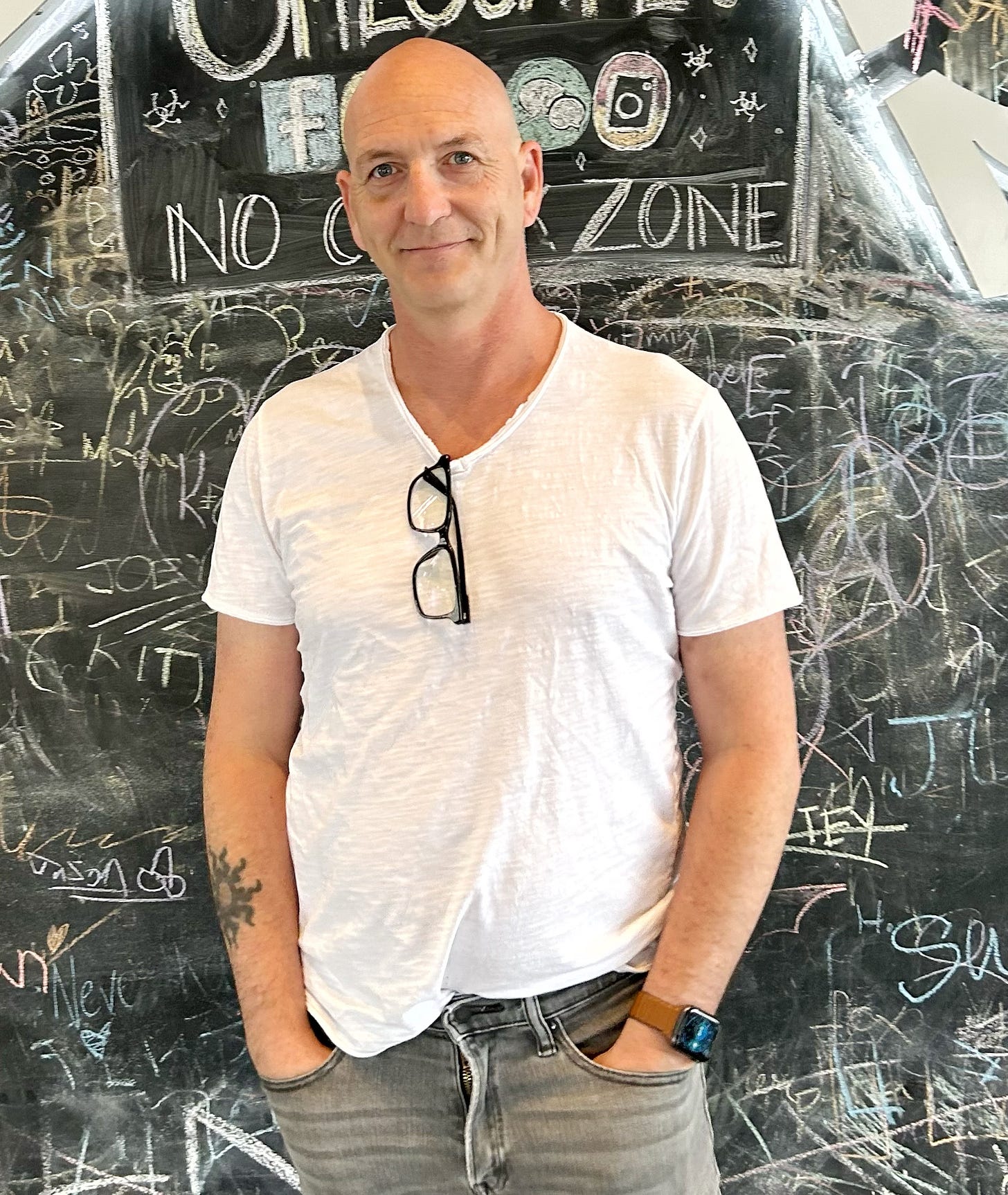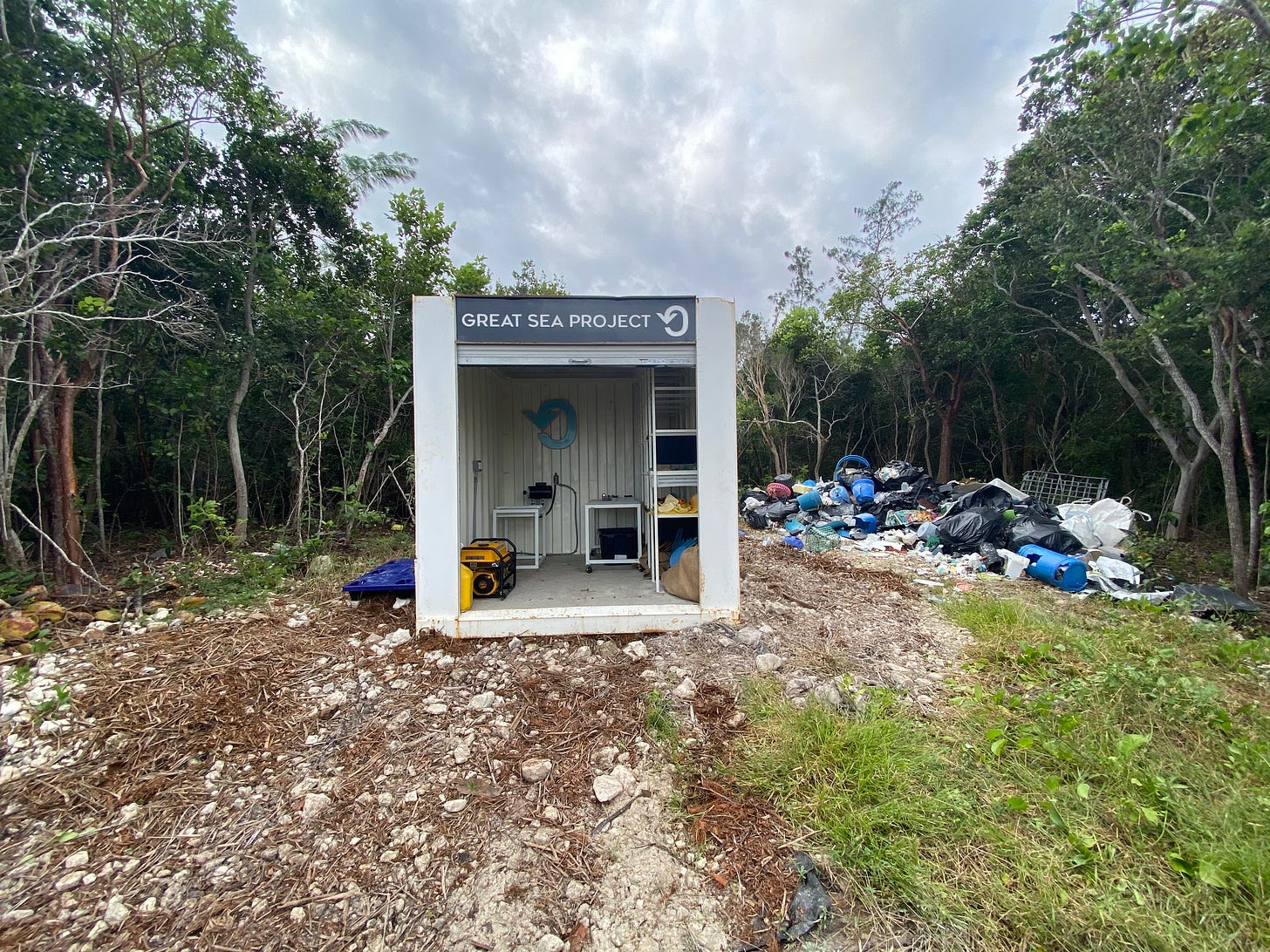Tackling Plastic Problems: EcoCycle Labs' is Disrupting Recycling Innovation
Voices: An Interview with Ryan Hollinrake, EcoCycle Labs
Over here at Climate North, we’ve been having conversations with some of the most forward-thinking leaders in the climate space —conversations that are too important and too inspiring to keep within closed circles. So we’re opening the doors and bringing you along. Welcome to Voices. This isn’t just about storytelling; it’s a call to action, a community of ideas, and a reminder that the future we dream of is one we build together.
This time around for Voices, we sat down with Ryan Hollinrake, founder of EcoCycle Labs. Ryan is a visionary leader in environmental sustainability and social innovation, with over 17 years of executive experience in non-profit management and sustainable development. Known for driving strategic turnarounds and pioneering scalable solutions to plastic pollution, Ryan is the founder of EcoCycle Labs and the innovator behind the WaveCycle off-grid recycling unit. His work has garnered international media recognition and accolades, including 3 nominations for the Earthshot Prize. A dynamic speaker and entrepreneur, Ryan continues to lead change at the intersection of environmental stewardship, community empowerment, and technological innovation.
EcoCycle Labs is a Canadian-based sustainability company committed to revolutionizing plastic waste management. They develop decentralized recycling solutions—like the WaveCycle unit—that operate off-grid and empower coastal and underserved communities to reclaim ocean plastics and transform them into valuable resources. By combining renewable energy, innovative tech, and community-driven engagement, we help reduce plastic pollution, foster circular economies, and create sustainable livelihoods.
Tell us about EcoCycle Labs and how it all got started?
EcoCycle Labs was born during the height of the COVID-19 pandemic. After toying with the idea and working on iterations for about a year I decided to take a self-funded risk and pilot a mobile plastic recycling unit in the Bahamas.
I had spent years watching how poorly managed waste - particularly ocean plastic - was affecting ecosystems and livelihoods. Quite often we look top down to solve issues but I knew there had to be a simpler solution. Addressing the complications of operating off grid and remote, I needed to find a solution that could operate anywhere, be easy to repair, and mobile. I also needed to figure out how to reduce the overall volume of the collected material. I did not want to create a solution that added to the environmental issues for example, by increasing emissions. I wanted to keep our footprint as low as I could. Lastly, I needed to build something that did not cost too much, being that the pilot was completely funded out-of-pocket. Guided by those considerations, I took the first steps toward the initial design.
The technology I had envisioned needed real-world validation, so we launched our first pilot in South Andros, which quickly proved both the viability and impact of a decentralized, solar-powered solution. This was very important, as most areas with centralized waste management or "organised municipal” programs are very cost prohibitive for remote areas. Take Toronto’s Blue Bin Program, for example—it would never work in a remote community, let alone on an island that has never had a recycling system. Not because they don’t (or can’t) have the infrastructure. But because there are no systems in place and it would take far too much time and money to implement. We needed a system that could operate anywhere by anyone. Our pilot laid the groundwork for EcoCycle Labs as it exists today: agile, community-focused, and built for real-world impact. This was born from an idea, a concept of what I felt was possible. Through the countless months of research, phone calls, site visits and sheer determination we built our first WaveCycle unit out of a recycled shipping container. We open sourced a design for a shredder, we played around with concepts for cleaning, we welded, we cut, we tested and we built our first prototype in April 2020. The design was simple, clean, with a minimal footprint. Despite the world shutting down for Covid, we pushed forward.
What is the mission that EcoCycle Labs is on? What problem are you looking to solve?
We are on a mission to eliminate plastic pollution in coastal and underserved areas by creating sustainable, local economies through decentralized recycling. Our WaveCycle system is a self contained, mobile, recycling plant that can be placed and operated anywhere on the planet. The core problem we tackle is the inaccessibility of recycling infrastructure in these regions, compounded by the ecological and social damage caused by marine plastic. Our WaveCycle units bring the solution directly to the communities that need it most—off-grid, efficient, and scalable.
Why do you believe it’s important for people to be aware of this problem and have access to a business like yours?
Plastic pollution is not just an ocean issue - it’s a human issue. It affects tourism, health, biodiversity, and long-term economic resilience. Most people don’t realize that traditional recycling doesn’t work in many parts of the world, especially where it's needed most. Traditional recycling is either mechanical or chemical - both with their own issues when it comes to sustainability and environmental impacts. Both require resources - money & manpower. Often those two things are not as available everywhere. A centralized system only works if the problem (plastic) is centralized as it isn’t in remote areas. Mechanical recycling as we know it - say Canada - is highly inefficient. It is a profit-based industry that is severely under regulated. That is why we hear in the media that only 9% of plastic is recycled (United Nations Development Programme). That number is a reference to what is put out for recycling and does not include plastics in the ocean, in the environment or in areas that do not have recycling programs. Globally that percentage would likely be closer to 5%. The issue really isn’t plastic - the issue is lack of regulation and resources. The solutions can be cheaper and easier but that wouldn’t make money. That’s why access to EcoCycle Labs’ approach - decentralized, low-energy, high-impact - is vital. It’s a solution built for real conditions, not just idealistic ones.
What projects and/or products are you excited about expanding on in 2025?
In 2026, we hope to scale up with new deployments across the Caribbean and parts of coastal Canada. We’re also developing a new version of our technology to improve on the end product – testing new material uses and alternate uses for the WaveCycle system. Over 46% of all plastic in the ocean is from fishing nets (The Oceans Cleanup), we hope to pilot a new design of the WaveCycle to process fishing gear and related materials outside of just plastic. Additionally, in the future we plan to launch a community-led product line made from recovered plastics, creating new income streams for local entrepreneurs. This model rounds out the overall program and is our proposed method to keep the project community focussed.
Can you tell us about some recent success stories or breakthroughs in the work you are doing?
Our pilot in South Andros, Bahamas, launched in November 2020, is a standout success. Over eight months, we recovered and processed hundreds of pounds of marine plastic and validated our model. Early on, I was told no one wanted ocean plastic because of the degradation and contamination. They told us it was unusable. The pilot allowed us to properly test our shredding, cleaning, and sorting methods. We took the very first sample (60 lbs) and sent it to a lab for proper material testing. The results were successful, proving the materials were usable. We introduced solar energy, expanded our shredder capacity, improved storage, and proved the viability of a decentralized recycling system. It became a model for future deployments.

What are common challenges that you encounter in your industry and while growing your business?
Lack of regulation, limited access to funding for decentralized tech, and outdated recycling systems are major hurdles. There’s also the perception issue - people often associate recycling with centralized, urban systems like the blue box program in Canada. They assume it is costly, and requires massive resources. Educating funders and partners on why localized, off-grid solutions matter is a constant but necessary challenge.
What motivates you to keep pushing forward?
The communities we work with. While in South Andros, I did a lot of outreach and community consultation. I have a belief that implementing a system in a community that doesn't want it will never work - no matter how much money you put into it. The stand out was the programs that the community had been doing for years through their schools and churches to keep the plastic from the oceans and the environment. The only issue they faced was that after collecting the materials, everything ended up in the same place–the landfill–which ultimately made its way back into the environment. They wanted a solution. A different solution, one that was sustainable. Seeing their enthusiasm, their pride in keeping their beaches clean, and the new potential for economic opportunities – those moments are priceless. I’m also motivated by my own belief that sustainability should be accessible, not exclusive. We can’t afford to wait for perfect systems—we need practical action now.
What type of impact do you hope that EcoCycle Labs will have on communities, ecosystems, or the planet at large?
We aim to clean coastlines, reduce carbon emissions, create jobs, and build a new model for waste management that is adaptable anywhere. Long-term, we want to redefine how the world thinks about recycling—not as an afterthought, but as a frontline climate solution that empowers local ownership and innovation.
Climate North is all about bringing people together to encourage real time action. How can individuals, communities and/or other organizations support your efforts?
Organizations can partner with us for deployments, sponsor a WaveCycle unit, or help fund education and outreach. Individuals can support by sharing our story, volunteering at deployments, or helping with fundraising. We also welcome collaborations with innovators in recycling tech, ocean conservation, and community development.
We see EcoCycle Labs as the catalyst and hope to build a community within.
If you wanted people to walk away remembering one thing about the work you’re doing, what would you want it to be?
That real solutions don’t have to wait. We have the tools and technology now to make a difference—and by bringing them directly to communities, we can change the world one shoreline at a time.
Where can people stay in-the-know about Ecocycle Labs ?
Visit our website at www.ecocyclelabs.com, follow us on Instagram @ecocyclelabs, or connect with me on LinkedIn.
This interview was hosted and edited by Chloe D’Agostini.










This is golden. Love the determination and tenacity. Up with Canadian entrepreneurs!